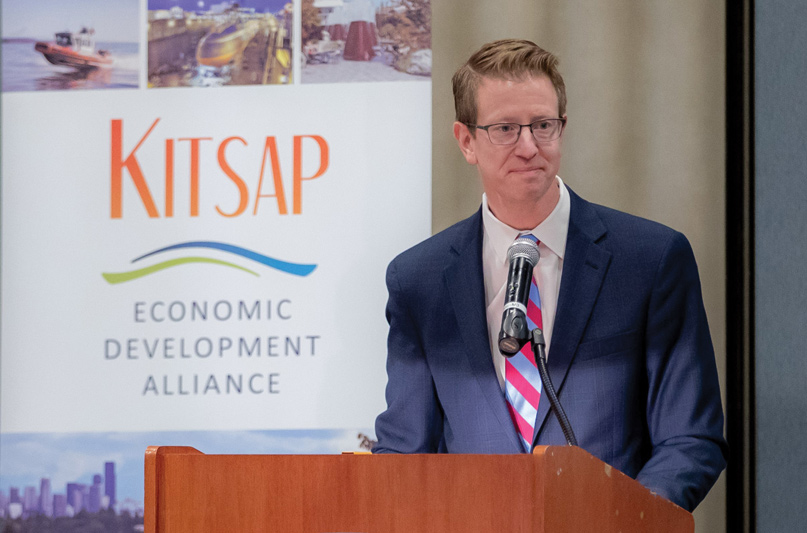Thursday, August 8 in Bremerton, Washington, was a memorable experience for me. The National Marine Manufacturers Association (NMMA), BoatUS, and the Northwest Marine Trade Association (NMTA) organized a meet-your-elected-official experience for citizens to meet with their federal congressman, Rep. Derek Kilmer (D-WA 6th District), on boating and fishing issues. Seven industry giants turned out for the conversation with Rep. Kilmer and about 30 boaters participated in the town hall.
Within 90 minutes, issues like tariffs, and permitting (NOAA Guidance) and fishing and more permitting (Point No Point boat ramp) filled the time with little to spare. Rep. Kilmer shared how he first decided to run for federal office.
“When I thought about running, I put together a pros-and-cons list. The biggest cons were that I had a one-year-old and four-year-old at the time. The more I thought about it, I saw that my kids were the biggest reasons why I should run for office,” he said.
Okay, I am biased. I am a big Rep. Kilmer fan. He understands what voters want. (At one point, he commented, “I see the same thing you see, Congress is a mess.”) We want his district to have solid employment, and he wants to provide assistance to his customers (excuse me, voters) whenever possible, exemplified by the story he told about how he was able to pin a Purple Heart on a veteran who fought in an area that the government had previously denied any involvement with during the Vietnam War.

He’s a quick study. He persists. He rolls up sleeves and his staff do the same.
On the side, I am taking an online cooking class taught by chef Thomas Keller of The French Laundry Restaurant Group fame. Chef Keller says that there are only two essential components to cooking: ingredients and execution. I’ve thought long and hard about this. Who am I to argue with a world-famous chef? Interestingly, he’s not just talking about cooking. He’s talking politics and government affairs, too.
As for ingredients, not all ingredients are the same. There are lots of choices. Similarly, not all 465 representatives count the same. While all important, some are more important than others for a boating perspective.
Is the district adjacent to water or a lake system? Are there many BoatUS members in that district? Is the lawmaker predisposed to already liking motorized activity? Do they boat? Are they on the right committees? Are they in a swing district? Do any of our members have a personal relationship with that member of Congress? Count the “yeses,” the more “yeses,” the more likely it is that someone of Rep. Kilmer’s stature should be an extra-important elected official.
Second comes the execution. You want to leave as little as possible to chance. When it comes to the annual boating advocacy trip to Washington, D.C. (that is, the American Boating Congress), trainings take place prior to Congressional meetings, connecting points are scripted out, role-playing takes place, a virtual walkthrough occurs; and the more prepared, the smoother these pitch-style meetings go. I know, not exactly shocking here.
Flipping the coin over, the same sort of targeting that “our side” does also takes place with Rep. Kilmer. He and his office could shuffle us off to a legislative aide. They would not have to set up a town hall to begin with. With that ingredients metaphor, they see us as critical to their stew, which feels damn good and is not always the case (but don’t get me started).
And it’s the little touches of high gloss that also signal a deep respect and understanding on Rep. Kilmer’s part. He comes to meetings prepared. He’s attentive. He jots down notes and he follows up. It’s not rare (as in like never) that I do not get a handwritten note from Rep. Kilmer after a D.C. meeting. Talk about the Nordstrom touch.
And to bring this all together, to hear an audience member ask a question like, “I read your newsletter every month, I’ve followed your career, but I’ve never met you. What was your mindset when you first went to D.C?” brings it home for me. This is serious stuff I am doing, connecting the dots for citizens, bringing people together. Yet, how cool is it that this issue is so non-partisan, so multi-faceted, and so fun?